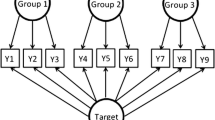Abstract
Self-compassion, or the ability to kindly accept oneself while suffering, is a topic of significant and growing scientific interest. Past research has shown, for example, that self-compassion is associated with less concurrent depression. So far, however, it remained untested whether self-compassion also prospectively predicts depression symptoms. Three hundred and forty-seven first-year psychology students (303 women; 44 men), ages 17–36, completed measures of self-compassion and depression symptoms at two assessments separated by a 5-month period. Results showed that self-compasion significantly predicted changes in depression symptoms, such that higher levels of self-compassion at baseline were significantly associated with greater reductions and/or smaller increases in such symptoms over the 5-month interval. These findings are consistent with the idea that self-compassion respresents a potentially important protective factor for emotional problems such as depression. Additional analyses further suggest that self-compassion is a relatively stable trait-like characteristic.
Similar content being viewed by others
References
Arrindell, W. A. (1993). The fear of fear concept: Stability, retest artefact and predictive power. Behaviour Research and Therapy, 31, 139–148.
Beck, A. T., Steer, R. A., & Brown, G. K. (1996). Beck Depression Inventory (2nd ed.). San Antonio, TX: The Psychological Corporation.
Bögels, S. M., Lehtonen, A., & Restifo, K. (2010). Mindful parenting in mental health care. Mindfulness, 1, 107–120.
Germer, C. K. (2009). The mindful path to self-compassion. New York: Guilford.
Gilbert, P. (2005). Compassion and cruelty: A biopsychosocial approach. In P. Gilbert (Ed.), Compassion: Conceptualisations, research and use in psychotherapy (pp. 9–74). Hove, UK: Routledge.
Gilbert, P., & Proctor, S. (2006). Compassionate mind training for people with high shame and self-criticism: Overview and pilot study of a group therapy approach. Clinical Psychology & Psychotherapy, 13, 353–379.
Howarth, E. (1978). The μ index for differentiating state and trait. Psychological Reports, 43, 474.
Kuyken, W., Watkins, E., Holden, E., White, K., Taylor, R. S., Byford, S., et al. (2010). How does mindfulness-based cognitive therapy work? Behaviour Research and Therapy, 48, 1105–1112.
Leary, M. R., Tate, E. B., Adams, C. E., Allen, A. B., & Hancock, J. (2007). Self-compassion and reactions to unpleasant self-relevant events: The implications of treating oneself kindly. Journal of Personality and Individual Differences, 92, 887–904.
Neff, K. D. (2003a). Development and validation of a scale to measure selfcompassion. Self and Identity, 2, 223–250.
Neff, K. D. (2003b). Self-compassion: An alternative conceptualization of a healthy attitude toward oneself. Self and Identity, 2, 85–102.
Neff, K. D., Kirkpatrick, K. L., & Rude, S. S. (2007). Self-compassion and adaptive psychological functioning. Journal of Research in Personality, 41, 139–154.
Neff, K. D. (2009). Self-Compassion. In M. R. Leary & R. H. Hoyle (Eds.), Handbook of individual differences in social behavior (pp. 561–573). New York: Guilford Press
Raes, F. (2010). Ruminating and worrying as mediators of the relationship between self-compassion and anxiety and depression. Personality and Individual Differences, 48, 757–761.
Raes, F., Pommier, E., Neff, K. D., & Van Gucht, D. (2010). Construction and factorial validation of a short form of the self-compassion scale. Clinical Psychology and Psychotherapy. doi:10.1002/cpp.702.
Van der Does, A. J. W. (2002). Manual of the Dutch version of the BDI-II. San Antonio, TX/Lisse, the Netherlands: The Psychological Corporation/Swets Test Publishers.
Vanheule, S., Desmet, M., Groenvynck, H., Rosseel, Y., & Fontaine, J. (2008). The factor structure of the Beck Depression Inventory–II: An evaluation. Assessment, 15, 177–187.
Author information
Authors and Affiliations
Corresponding author
Rights and permissions
About this article
Cite this article
Raes, F. The Effect of Self-Compassion on the Development of Depression Symptoms in a Non-clinical Sample. Mindfulness 2, 33–36 (2011). https://doi.org/10.1007/s12671-011-0040-y
Published:
Issue Date:
DOI: https://doi.org/10.1007/s12671-011-0040-y




